Unit 11 How was your school trip单元复习课件(词组+句型+知识点+语法+写作指导+易错考点)
文档属性
| 名称 | Unit 11 How was your school trip单元复习课件(词组+句型+知识点+语法+写作指导+易错考点) | 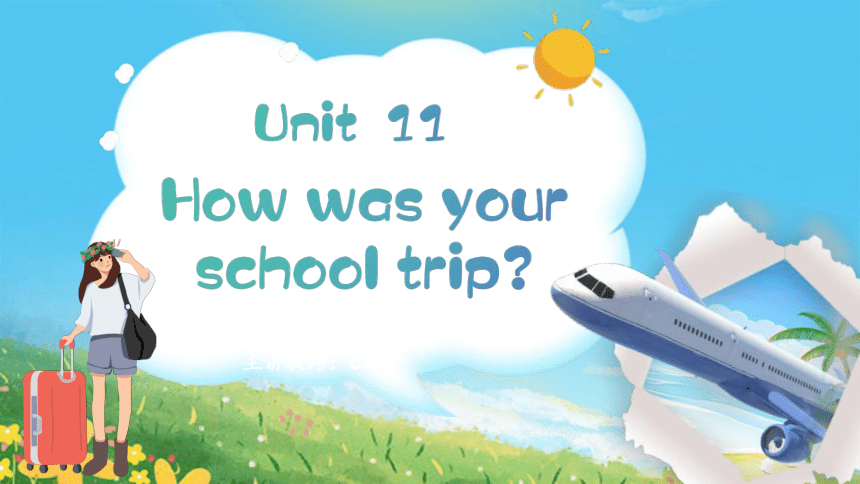 | |
| 格式 | pptx | ||
| 文件大小 | 51.5MB | ||
| 资源类型 | 试卷 | ||
| 版本资源 | 人教新目标(Go for it)版 | ||
| 科目 | 英语 | ||
| 更新时间 | 2024-05-27 15:49:58 | ||
图片预览

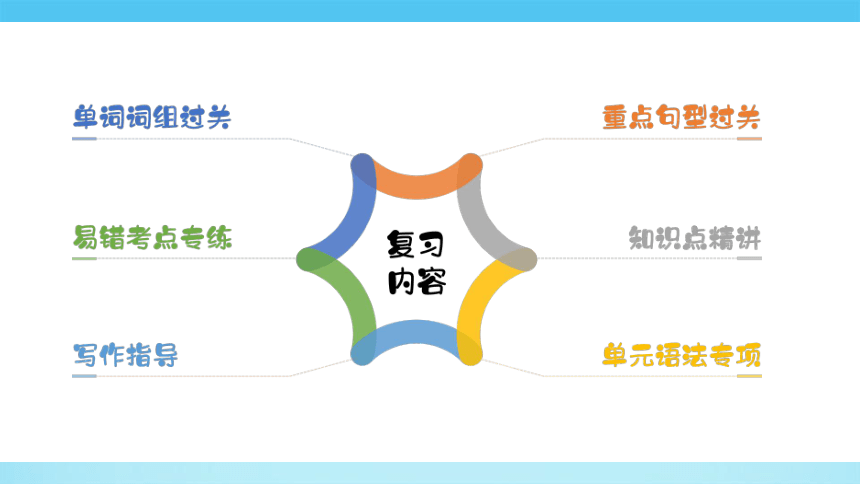

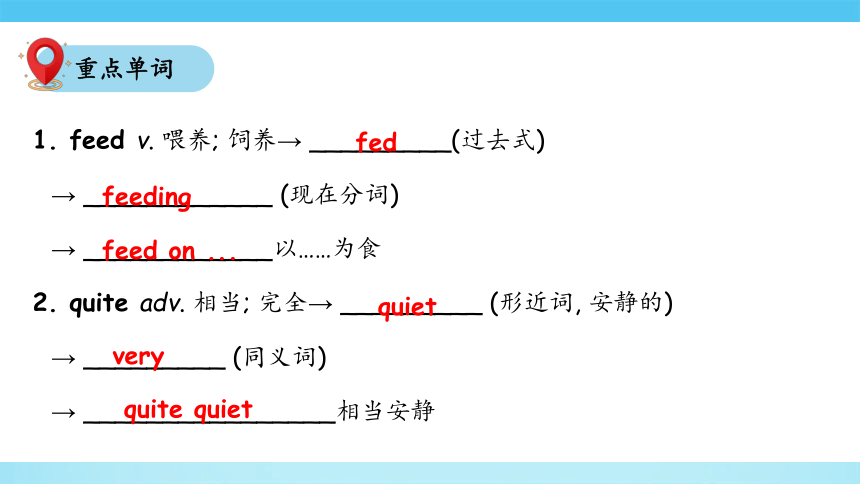
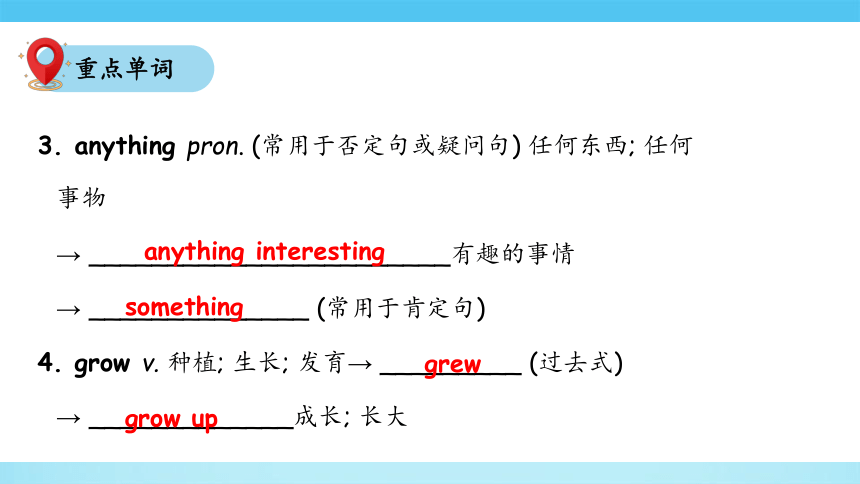
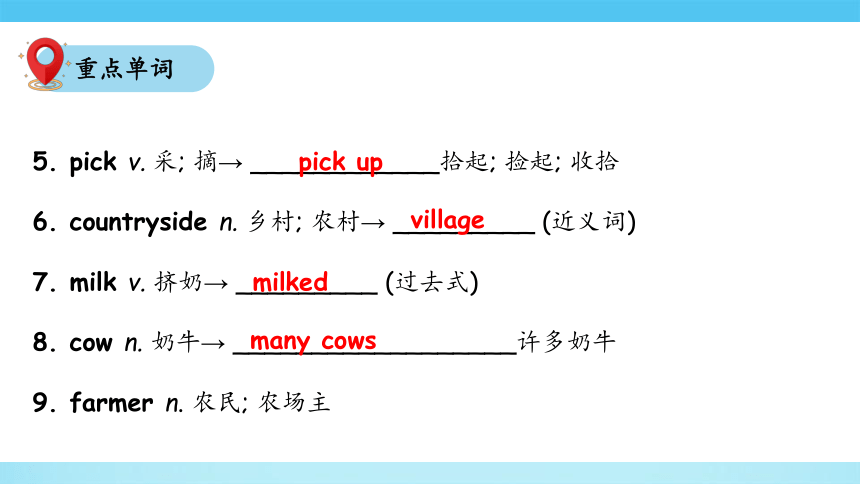
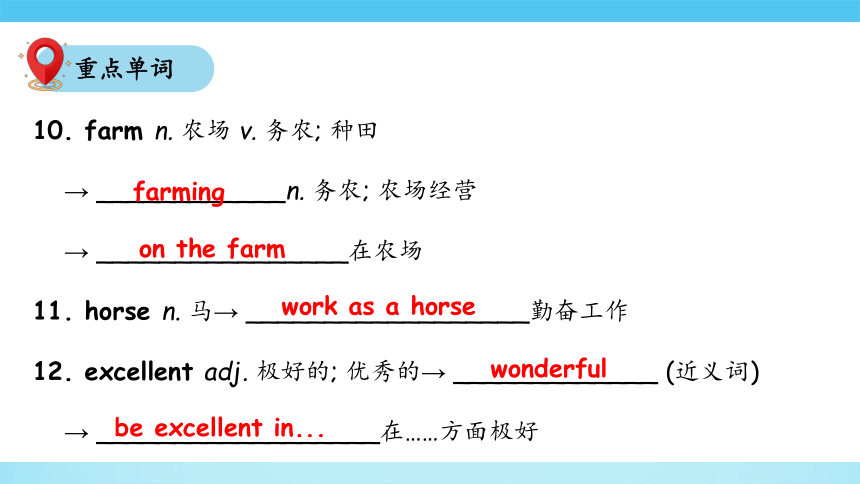

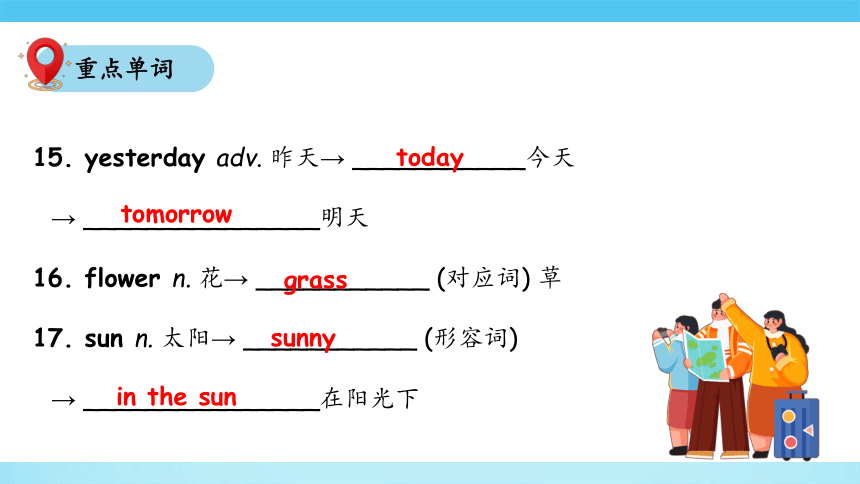
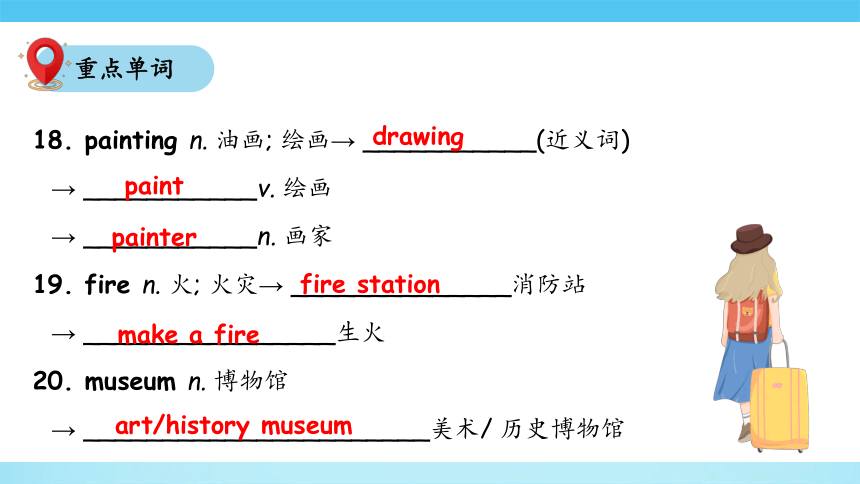
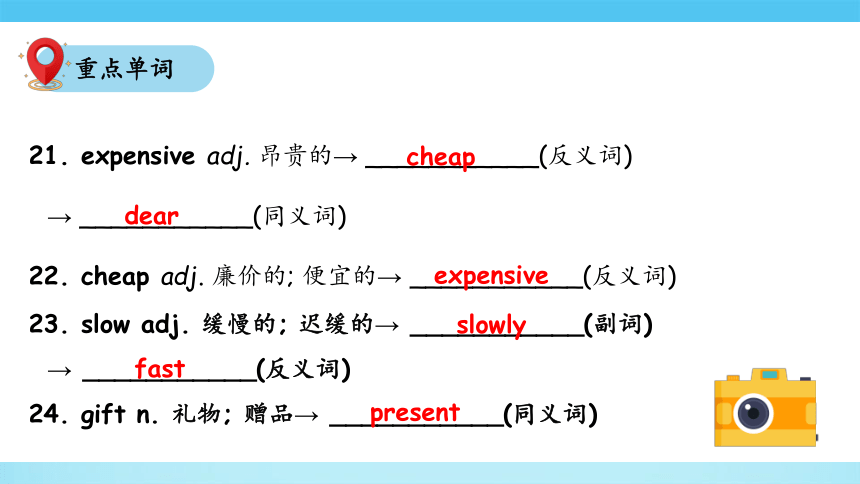
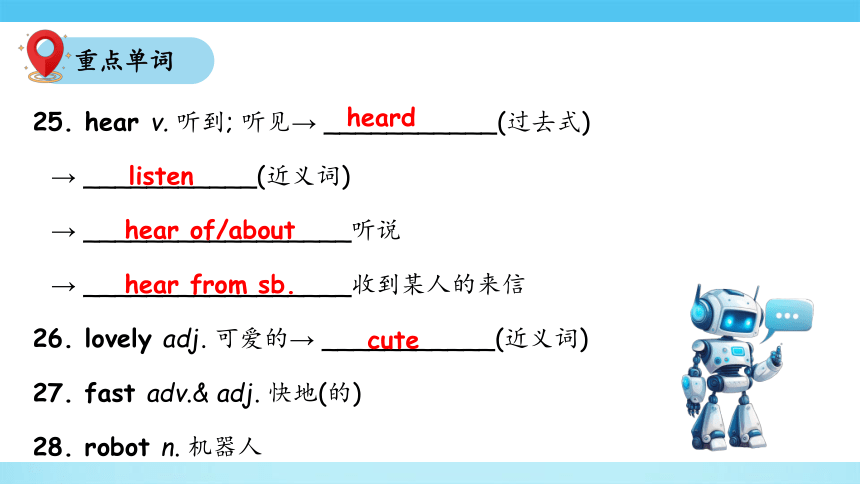
文档简介
(共175张PPT)
主讲教师:Cici
重点单词
1. feed v. 喂养; 饲养→ _________(过去式)
→ ____________ (现在分词)
→ ____________以……为食
2. quite adv. 相当; 完全→ _________ (形近词, 安静的)
→ _________ (同义词)
→ ________________相当安静
fed
feeding
feed on ...
quiet
very
quite quiet
3. anything pron. (常用于否定句或疑问句) 任何东西; 任何事物
→ _______________________有趣的事情
→ ______________ (常用于肯定句)
4. grow v. 种植; 生长; 发育→ _________ (过去式)
→ _____________成长; 长大
重点单词
anything interesting
something
grew
grow up
重点单词
5. pick v. 采; 摘→ ____________拾起; 捡起; 收拾
6. countryside n. 乡村; 农村→ _________ (近义词)
7. milk v. 挤奶→ _________ (过去式)
8. cow n. 奶牛→ __________________许多奶牛
9. farmer n. 农民; 农场主
pick up
village
milked
many cows
重点单词
10. farm n. 农场 v. 务农; 种田
→ ____________n. 务农; 农场经营
→ ________________在农场
11. horse n. 马→ __________________勤奋工作
12. excellent adj. 极好的; 优秀的→ _____________ (近义词)
→ __________________在……方面极好
farming
on the farm
work as a horse
wonderful
be excellent in...
重点单词
13. worry v.& n. 担心; 担忧→ ___________(第三人称单数)
→ ___________ (过去式) → _____________________=
____________________________担心……; 忧虑……
14. luckily adv. 幸运地; 好运地→ ___________ (名词)
→ ________ (形容词) → _________ (反义词, 不幸运地)
worries
worried
worry about
be worried about
luck
lucky
unluckily
重点单词
15. yesterday adv. 昨天→ ___________今天
→ _______________明天
16. flower n. 花→ ___________ (对应词) 草
17. sun n. 太阳→ ___________ (形容词)
→ _______________在阳光下
today
tomorrow
grass
sunny
in the sun
重点单词
18. painting n. 油画; 绘画→ ___________(近义词)
→ ___________v. 绘画
→ ___________n. 画家
19. fire n. 火; 火灾→ ______________消防站
→ ________________生火
20. museum n. 博物馆
→ ______________________美术/ 历史博物馆
drawing
paint
painter
fire station
make a fire
art/history museum
重点单词
21. expensive adj. 昂贵的→ ___________(反义词)
→ ___________(同义词)
22. cheap adj. 廉价的; 便宜的→ ___________(反义词)
23. slow adj. 缓慢的; 迟缓的→ ___________(副词)
→ ___________(反义词)
24. gift n. 礼物; 赠品→ ___________(同义词)
cheap
dear
expensive
slowly
fast
present
重点单词
25. hear v. 听到; 听见→ ___________(过去式)
→ ___________(近义词)
→ _________________听说
→ _________________收到某人的来信
26. lovely adj. 可爱的→ ___________(近义词)
27. fast adv.& adj. 快地(的)
28. robot n. 机器人
heard
listen
hear of/about
hear from sb.
cute
重点单词
29. guide n. 导游; 向导→ _______________导盲犬
30. dark adj. 黑暗的; 昏暗的→ ___________(反义词)
guide dog
bright
重点词组
1. _________________给奶牛挤奶
2. _________________在乡下; 在农村
→ _________________在城镇
→ _________________在城市
3 ___________骑马→(谚语) _________________趾高气扬。
milk a cow
in the countryside
in town
in the city
ride a horse
Ride the high horse.
重点单词
4. _________________喂鸡
5. _________________许多
6. _____________________总的来说
7. _____________________对……感兴趣
feed chickens
quite a lot(of...)
all in all
be interested in
重点句型
1. —_________ you see any cows 你看到奶牛了吗
—_________, _________ _________. I saw _________ _________ _________.
是的, 我看到了。我看到了许多(奶牛) 。
Did
Yes I did quite
a lot
重点句型
2. —________ ________ ________ ________ last week
你上周的旅行怎么样
—_________ _________ _________.
棒极了。
How was your trip
It was excellent
重点句型
6. —________ ________ ________ to the zoo
你去动物园了吗
—________ , ________ ________. I went to a farm.
不, 我没有。我去了农场。
Did you go
No I didn’t
重点句型
7. —________ the strawberries good
草莓好吃吗
—_______, _______ _______./_______, _______ _______.
是的, 它们好吃。/ 不, 它们不好吃。
8. We ________ ________ ________ ________!
我们玩得非常愉快!
Were
Yes they were No they weren’t.
had so much fun
重点句型
13. Then the guide ________ ________ ________ ________ ________ ________ ________ ________.
然后导游教我们如何制作机器人模型。
14.The air was _________ _________, and I saw _________ _________ _________ _________.
空气是如此清新, 并且我看到了许多花。
taught us how to
make a model robot
so clean a
lot of flowers
知识点1:milk /m lk / v. 挤奶
考向:milk 作及物动词,意为“挤……的奶”。
词组:milk a cow 给奶牛挤奶
e.g. Now they are milking a cow.
现在他们正在给奶牛挤奶。
知识点1:milk /m lk / v. 挤奶
拓展:(1)milk 还可用作不可数名词,意为“牛奶;奶”。
e.g. Do you take milk in your tea 你茶里加奶吗?
(2)和“牛”有关的英语单词:milk(牛奶) beef(牛肉)
cow(母牛;奶牛) ox(公牛)
veal(小牛肉)
典型例题
—How much ________ do you need
—We need two cups.
A. milk B. egg
C. pear D. potato
知识点2:feed /fi d/ v. 喂养;饲养(feed—fed—fed)
考向:feed 用作及物动词, 其后常接表示动物的名词作宾语。
feed 的常用搭配:
① feed...to... 把……喂给……
② feed...on/with... 用……喂养……
③ feed on... (动物)以……为食
知识点2:feed /fi d/ v. 喂养;饲养(feed—fed—fed)
e.g. My grandma feeds chickens every day. 我奶奶每天都喂鸡。
Please feed some fish to the cat. 请给猫喂些鱼。
Let’s feed the monkey on/with some bananas.
让我们给猴子喂些香蕉吧。
Pandas are black and white. They feed on bamboo.
大熊猫黑白相间。它们以竹子为食。
知识点2:feed /fi d/ v. 喂养;饲养(feed—fed—fed)
拓展:feed 作及物动词,还可意为“养;养活(全家,一群人)”。
e.g. The elder brother had many children to feed.
哥哥有许多孩子要养活。
典型例题
He makes robot bees to help _______ and look after the queen bee.
A. wash B. feed
C. use D. milk
【点拨】句意:他制造了机器人蜜蜂来帮助喂养和照顾蜂王。由look after及选项可知,feed 符合语境。
知识点3:quite a lot 许多
考向:quite a lot 许多,在句中修饰动词
e.g. He drank quite a lot.
他喝了好多。
辨析: quite 与very
非常 quite 程度副词,意为“相当;非常”,可修饰副词、形容词、动词。只能放在不定冠词a /an 之前。可以修饰a lot ,a few,a little 等短语。常用结构为“quite + a/an+ 形容词+ 名词”。
very 程度副词,意为“很,非常”,语气比quite 重。可修饰副词和形容词,不可直接修饰动词。一般放在不定冠词a/an 之后。可修饰few,little 等词。常用结构为“a+very+ 形容词+ 名词”。
知识点3:quite a lot 许多
e.g. It’s quite/very necessary to stop school bullying.
阻止校园欺凌非常有必要。
My brother thinks Li Lei sings quite/very well.
我哥哥认为李雷唱得非常好。
She quite likes swimming. 她非常喜欢游泳。
Tom is a very good boy. = Tom is quite a good boy.
汤姆是个很好的男孩。
易错点
① quite a lot of 意为“许多……”,后接可数名词复数或不可数名词。
e.g. quite a lot of food 很多食物
② quite a little 意为“相当多的”,修饰不可数名词。
e.g. quite a little time 相当多的时间
典型例题
—Why do you want him to join us
—Because he is _______.
A. good a quite player B. quite a good player
C. a quite good player D. quite good a player
知识点4:anything /'en θ / pron. 任何东西;任何事
考向①: anything 常用于否定句或疑问句中, 用来代替something。
e.g. Can I get you anything to drink first
我能先给你拿些喝的东西吗?
We can’t believe anything he says.
我们无法相信他说的任何事。
知识点4:anything /'en θ / pron. 任何东西;任何事
考向②: anything 表示“随便哪个东西; 随便什么事物”时, 一般用于
肯定句。
e.g. I want something to drink and anything is OK.
我想要喝点东西, 什么都行。
口诀记复合不定代词的用法:
复合代词不一般,
修饰成分在后边;
如若用来作主语,
谓语动词用单三。
表示物的不定代词
something 某事,某物
anything 任何事物
nothing 没有什么
everything 所有事物,一切
表示人的不定代词
somebody 某人
anybody 任何人
nobody 没有人
everybody 所有人,人人
拓展:anything 具体用法还有:
用法 示例
形容词修饰anything 时,应置于其后。 Did you hear anything interesting
你有没有听到什么有趣的事
在表示请求、建议或征求意见的疑问句中不用anything,而要用something。 Would you like something to eat
你想要吃点东西吗
anything 作主语时, 谓语动词用单数。 Anything in the room is his.
这个房间里的任何东西都是他的。
典型例题
—Did you do _______ special for your mother on her birthday
—Yes. I cooked long noodles for her.
A. nothing B. something
C. everything D. anything
【点拨】由答语可知,问句问是否为妈妈的生日做了什么特别的事,故空处填“某事”。本句是一般疑问句,用anything。
知识点5:grow/ɡr / v. 种植; 生长; 发育
谚语:
It takes ten years to grow a tree, but a hundred to bring up a person.
十年树木,百年树人。
用法 示例
及物动词, “种植; 栽培”, 过去式是grew。 We grow flowers in our garden.
我们在我们的花园里种花。
不及物动词,“成长;生长;发育”。grow up 意为“长大;成长”;grow into 意为“成长为……” In spring, everything begins to grow.
在春天, 万物开始生长。
She wants to be a teacher when she grows up.
她长大后想当一名老师。
The little boy will grow into a strong man.
这个小男孩将会长成一个强壮的男子汉。
可作连系动词, 有“逐渐变得”的含义, 强调变化过程。 It’s growing dark. 天渐渐(变)黑了。
He grew excited when he met his old friend.
当他见到老朋友时,他变得很激动。
典型例题
—What are you going to be when you _______
—I want to be a doctor like Wu Mengchao.
A. grow up B. turn up C. get up
【点拨】用语境判定法。grow up 长大;turn up 调大; get up 起床。由答语“我想成为像吴孟超一样的医生”可知问句是问你长大之后想干什么。grow up 符合语境。
知识点6:show. . . around 带……参观
词组:show sb. around 带某人四处看看
e.g. Let me show you around the city.
让我带你参观这座城市。
I like this place. Please show me around.
我喜欢这个地方,请带我四处看看。
与show 有关的常见短语还有:
show up 露面;出现
show off 炫耀
around 相关短语
① turn around 转身
② look around 环顾四周
③ travel around 到处旅行
④ go/walk around 闲逛;到处走动
知识点7:farm /fɑ (r)m/ n. 农场v. 务农;种田
e.g. There are many cows on the farm.
在农场里有很多奶牛。
My parents are farming in the village.
我父母在村里务农。
The farmers work on farming all year round.
农民们全年都在务农。
n.on the farm 在农场里
v.种田,务农
farm 的词形变化:
①farming 不可数名词 农事;务农
②farmer 可数名词 农民;农场主
知识点8:pick /p k/ v. 采;摘
pick 的一词多义:采;摘;挑选
e.g. Pick a number from one to five.
从一至五中挑选一个数字。
Don’t pick flowers in the garden.
不要摘花园里的花。
知识点8:pick /p k/ v. 采;摘
拓展:pick up 意为“捡起;拿起;搭载;接某人”。
e.g.Mr. Smith picked up his hat and went out.
史密斯先生拿起帽子, 走了出去。
Pick me up at the hotel.
到旅馆来接我。
“动词+ 副词”短语,代词作宾语放中间。
典型例题
Please _______ the rubbish (垃圾) and put it into the proper
rubbish bin.
A. look up B. pick up C. grow up
知识点9:How was... ……怎么样
How was your trip last week
考向:本句是一般过去时的特殊疑问句,
句型结构:“How + was + 主语+ 其他?”
意为“……怎么样?”
同义句:How is... = What’s... like
=What do you think of...
知识点9:How was... ……怎么样
答语:常用“It was great!(太棒了!)/ It was OK.(还可以。)/ It wasn’t good.(不好。)/It was not bad.(还不错。)”等来回答。
e.g. — How was your holiday this year
你今年的假期怎么样?
— Really good. 相当好。
典型例题
—Hi, Jack! _________
—It was great. I want to watch it again.
A. Why did you come here
B. How was the movie last night
C. Did they go to the park yesterday
D. Could you show him the way
知识点10:excellent /'eks l nt/ adj. 极好的;优秀的
考向:excellent 相当于very good,通常用于肯定句中。excellent 前有不定冠词时,应用an。
词组:be excellent in/at...表示“在……方面极好”。
e.g. The food is excellent here. 这里的食物很好。
Keep practising, and you’ll be an excellent football player.
坚持练习,你就会成为一名出色的足球运动员。
He is excellent in math. 他数学非常好。
知识点11:countryside /'k ntrisa d/ n. 乡村;农村
考向:常与the 连用。in the countryside 意为“在乡下; 在农村”。
e.g. Li Ming comes from the countryside. 李明来自农村。
拓展:country 作名词,意为“国家;乡下;乡村”。
e.g. The players are from different countries.
运动员来自不同的国家。
We want to take a vacation in the country.
我们想去乡下度假。
知识点12:so much 如此多
考向:so much 一般用来修饰不可数名词或动词。
e.g. There was so much noise in the classroom.
教室里太吵了。
I slept so much last night. 昨晚我睡了那么久。
There are so many intelligent robots on show.
有那么多的智能机器人正在展出。
so many 意为“如此多;这么多”,修饰可数名词复数。
典型例题
There is ______ water in the river. You must be careful.
A. so many B. so much
C. so far D. so
知识点13:fun /f n/ n. 乐趣;娱乐
考向:fun 作不可数名词,意为“乐趣;快乐”,其前常用great,
much, a lot of 等修饰,用来加强语气。
词组:have fun (in) doing sth.= have a great time doing sth.
意为“很开心/高兴/愉快地做某事”。
e.g. Skating is great fun. 滑冰非常有趣。
知识点13:fun /f n/ n. 乐趣;娱乐
拓展:
(1) have fun 意为“玩得开心”,相当于have a good/great/wonderful time 及enjoy oneself。
e.g. Free time is a good chance for teenagers to have fun.
空闲时间是青少年享受乐趣的一个好机会。
We had fun playing(= had a great time playing
= enjoyed ourselves) in the snow. 我们在雪地里玩得很快乐。
知识点13:fun /f n/ n. 乐趣;娱乐
拓展:
(2) fun 还可作形容词,意为“有趣的;使人快乐的”。
e.g. Cooking is an important skill, and it can be fun.
烹饪是一项重要的技能,并且它会很有趣。
I’ll tell you a funny story.
我来给你讲一个有趣的故事。
词形变换:fun n. 乐趣;快乐→ funny adj.滑稽的;好笑的
典型例题
They had a great time at the party last night. (改为同义句)
They _______ _______ _______ at the party last night.
had much fun
知识点14:worry /'w ri/, /'w ri/ v.& n. 担心;担忧
考向①:worry 作动词,意为“担心;担忧”。
e.g. I always worried that I couldn’t pass the exam.
我总是担心我不能通过考试。
Nothing worries me. 没有什么事使我担心。
Don’t worry about his grades. 不要担心他的成绩。
知识点14:worry /'w ri/, /'w ri/ v.& n. 担心;担忧
考向②:worry 作不可数名词,意为“忧虑;担心”;作可数名词,意为“令人担忧的事”。
e.g. No one wants to have worry. 没有人想有烦恼。
She is full of worries. 她有种种烦恼。
worry 作动词时的常见用法:
① worry + that 从句 担心/担忧……
② worry + sb.
使某人担心;使某人发愁
③ worry about... 担心……;忧虑……
worry 的词形变化:
worried adj. 担心的;担忧的(主语多为sb.)
worrying adj. 令人担忧的 (主语多为sth.)
be worried about... 担心……
典型例题
1.不要担心未来,开启你的新旅程吧。
Don’t _______ _______ tomorrow. Set out on your new journey.
2.— Oh, no! My mobile phone is missing!
—_______. Go to the lost and found office. They might have it.
A. Don’t worry B. Thanks a lot
C. It sounds great D. That’s cool
worry about
知识点15:luckily /'l k li/ adv. 幸运地;好运地
考向:luckily 通常放在句首,修饰整个句子。
e.g. Luckily, we got on the bus in time.
幸运的是,我们及时上了公共汽车。
luck 的词形变化:
luck n.
运气
unlucky adj. 不幸的
lucky adj. 幸运的
luckily adv. 幸运地
unluckily adv. 不幸地
反义词
反义词
知识点15:luckily /'l k li/ adv. 幸运地;好运地
拓展:(1) a lucky dog 幸运儿
e.g. —He won the lottery again. 他的彩票又中奖了。
—What a lucky dog! 真是个幸运儿!
(2) Lucky you!“你真幸运!”。非正式口语,相当于“You’re so lucky!”。you 还可改为me,him 等。
e.g. —I arrived home before the heavy rain. 我在大雨前回到了家。
—Lucky you !你真幸运!
典型例题
______________(幸运地), my uncle became a passenger of the
maiden flight(首航)of the C919.
【点拨】句意:幸运的是,我叔叔成为了C919 首飞的乘客。luckily“幸运地”,是副词,修饰整句。
Luckily
知识点16:come out 出现
考向:come out 意为“(太阳、月亮、星辰)出现”,是不及物动词短语,后不接宾语。
e.g. The sun is coming out. 太阳就要出来了。
come 的相关短语:
come on 快点 come true 实现 come back 回来
come from 来自 come over 顺便拜访
拓展:come out 的其他常见含义:
come out (花)盛开;开花
e.g. The flowers come out in spring. 花儿在春天开放。
出版;发表
e. g. My new novel will come out this month.
我的新小说将于这个月出版。
(消息、真相等)被获知;为人所知
e. g. When the news came out, everyone was surprised.
消息传来,每个人都很惊讶。
典型例题
—I can’t see anything in your garden, Grandpa.
—But in spring, the flowers all ______.
A. come over B. come in
C. come on D. come out
【点拨】come over 过来;come in 进来;come on加油;come out 盛开。根据句意可知花朵在春天会盛开,可知答案选D。
知识点17:museum/mju 'zi m/n. 博物馆
常见搭配:go to the museum 去博物馆;
visit the museum 参观博物馆。
e.g. He works in a history museum.
他在历史博物馆工作。
各种博物馆
the Palace Museum 故宫博物院
the art museum 艺术博物馆
the natural science museum
自然科学博物馆
知识点18:fire /'fa (r)/ n. 火;火灾
fire “火”,不可数名词。
e.g. It took an hour to put out the fire.
扑灭火用了一个小时。
“火灾”,可数名词。
e.g. There was a fire there yesterday.
昨天那儿有一场火灾。
“炉火;灶火”,可数名词。
e.g. I’m reading near a fire. 我正坐在炉火边读书。
有关fire 的短语:
be on fire 着火 catch fire 着火
make a fire 生火
put out a fire 灭火
fire station 消防站
知识点19:painting /'pe nt / n. 油画;绘画
e.g. I saw different paintings in the art room.
我在艺术室里看到了不同的画。
The boy is painting. 男孩儿正在画画儿。
Let’s paint the desk white. 让我们把课桌涂成白色吧。
用作可数名词
词形变化:
paint v. 用颜料画;在……上刷油漆
painter n. 画家;油漆工
知识点20:lovely /'l vli/ adj. 可爱的
考向:虽以-ly 结尾,却是形容词!
e.g. What a lovely baby!
多么可爱的婴儿啊!
How lovely the little house is!
这座小房子多可爱啊!
修饰人
修饰物
由“名词+-ly”构成的形容词:
friend—friendly
week—weekly
man—manly
知识点22:slow/sl /adj. 缓慢的;迟缓的
考向:slow 既可用作形容词,也可用作副词。反义词为fast 意为“快的”。slow 的副词形式为slowly, 意为“ 缓慢地,慢慢地”。
e.g. He is driving slow, listening to slow music.
他慢慢地开着车,听着慢节奏的音乐。
This train is really slow, but that one is fast.
这列火车真的很慢,但那列很快。
知识点22:slow/sl /adj. 缓慢的;迟缓的
拓展:(1) slow 与slowly 都用作副词时,用法不同:
辨析: slow 与slowly
slow 可用于口语或非正式文体; 不可用于句首; 可与how连用; 常和go, drive 或pass等连用且位于其后。
slowly 比较常用, 可置于句首或动词之后(或前) 修饰动词。
知识点22:slow/sl /adj. 缓慢的;迟缓的
e.g. How slow the time passes! 时间过得真慢啊!
I told the driver to go slow. 我告诉司机慢慢开车。
Slowly things began to improve. 慢慢地,情况开始好转了。
She is working slowly. 她在慢慢地工作。
He slowly opened the door. 他慢慢地打开了门。
知识点22:slow/sl /adj. 缓慢的;迟缓的
(2) slow 还可以作动词,意为“减速;慢下来”。
e.g. Slow down and stop at a yellow light.
遇到黄灯时要减速并停下。
典型例题
The doctor said, “You must walk s because of your leg wound.”
【点拨】用语法分析法。由空格后“由于你的腿伤”可知,此处表示“慢慢走”;修饰动词walk 要用副词。
lowly
知识点23:exciting/ ksa t /adj. 使人兴奋的; 令人激动的
考向:exciting 以元音音素开头,不定冠词用an。
e. g. What an exciting movie that is!
那是多令人激动的一部电影啊!
I’m excited at the exciting news.
这个令人兴奋的消息令我感到兴奋。
知识点23:exciting/ ksa t /adj. 使人兴奋的; 令人激动的
辨析: exciting 与excited
exciting “使人兴奋的”, 常作定语或表语, 作表语时, 主语通常是物, 强调事物所拥有的特征。
excited “兴奋的”, 常作表语, 主语通常是人, 强调人的情绪。
典型例题
The ______ news made him ______. He didn’t fall asleep until
midnight.
A. excited;excited B. exciting;exciting
C. exciting;excited D. excited;exciting
知识点24:expensive/ kspens v/ adj. 昂贵的
考向:expensive 以元音音素开头,前有不定冠词时用an。
expensive 相当于dear。
e.g. This is an expensive car. 这是一台昂贵的车。
There must be something expensive in the box.
盒子里一定有贵重的东西。
知识点24:expensive/ kspens v/ adj. 昂贵的
辨析: expensive 与high
expensive 表示“昂贵的; 花钱多的”; 反义词cheap表示“廉价的; 便宜的”, 其主语必须是货物或物品本身。
high 表示价格“高”, 反义词low表示价格“低”, 其主语为price。
知识点24:expensive/ kspens v/ adj. 昂贵的
e.g. This car is expensive, but that one is cheap.
这辆小汽车昂贵, 但那辆便宜。
The price of this watch is very high.
这块手表的价格非常高。
易错点:
物品分贵(expensive)贱(cheap);
价格论高(high)低(low)
典型例题
—The computer desk in the store is so ______ that I can’t afford it.
—Why not buy a second-hand one on the Internet
A. large B. heavy C. expensive
典型例题
The price of the sweater is very _______. I can’t afford it.
A. expensive B. cheap
C. high D. low
知识点25:fast/fɑ st/adv. & adj. 快地(的)
fast 的具体用法:
fast adv. “快地”
e.g. Sound travels very fast. 声音的传播速度很快。
adj. “快的”
e.g. Do you like fast food 你喜欢快餐吗?
fast 用作副词时,反义词是slowly/slow;用作形容词时反义词是slow。
知识点26:gift/ɡ ft/n. 礼物; 赠品
考向:gift 是可数名词,同义词为present。
e. g. Thanks for your gift. 谢谢你的礼物。
拓展:gift 作名词,还可意为“天赋;才能”。
e.g. He has the gift of making friends easily.
他天生善交朋友。
知识点27:all in all 总的来说
辨析: all in all, in all, after all与above all
all in all 意为“总的来说”, 常用于句首。
in all 意为“总共; 合计”, 既可放在句首, 也可放在句末。
after all 意为“毕竟; 终究”, 可位于句首、句中或句末。
above all 意为“尤其是; 最重要的是”, 常位于句首或句中作插入语。
e.g. All in all, the earth is our home and it’s our duty to protect it.
总的来说,地球是我们的家园,我们有责任保护它。
There are fifty students in all.
总共有50 名学生。
After all, we like the 5G network better.
毕竟,我们更喜欢5G 网络。
Above all, tell me quickly what I should do.
最重要的是,快点告诉我该做什么。
典型例题
—How was your trip, Linda
—It rained at the beginning. But ______, it’s a nice trip.
A. above all B. in all
C. all in all D. at all
知识点28:everything /'evriθ / pron. 所有事物;一切
考向:everything 作主语时,谓语动词用第三人称单数。
e.g. Everything begins to grow and flowers come out.
万物开始生长,鲜花盛开。
Nothing stopped him from trying everything here.
没有什么阻止他尝试这里所有的东西。
典型例题
— Sandy is well organized(有条理的).
—Exactly. _____ in her room is in good order(井井有条).
A. Something B. Everything
C. Nothing D. None
【点拨】用语境判定法。Something 某事物;Everything 每件事物,一切;Nothing 没有东西;None 没有一个。由语境可知,Everything符合句意。
知识点29:be interested in... 对……感兴趣
考向:be interested in... 相当于show/take an interest in,后接名词、代词或动词的-ing 形式。
e.g. Also, I am interested in Chinese culture.
此外,我对中国文化感兴趣。
She is interested in singing.
= She shows/takes an interest in singing.
她对唱歌感兴趣。
知识点29:be interested in... 对……感兴趣
辨析: interested 与interesting
interested “感兴趣的”, 表示人的主观感受。 作表语
interesting “有趣的; 有吸引力的”, 表示事物的特征。 作表语或定语
一语辨异:
I’m interested in reading. I think it is interesting to read some interesting stories in my free time. 我对读书感兴趣。我觉得在空闲时读些有趣的故事很有趣。
典型例题
—How do you like my poem Moonlight
—I ______ it. It’s about the beauty of nature.
A. am interested in B. am worried about
C. am thankful for
【点拨】be interested in 对……感兴趣;be worried about
担心;be thankful for 对……表示感激。根据“It’s about the beauty of nature.”可知,此处表示对诗感兴趣。
知识点30:hear /h /, /h r/ v. 听到;听见
考向:hear 用作及物动词时,后接名词、代词或that 从句。(过去式heard)
e.g. She can’t hear anything. 她什么也听不到。
I’m sorry to hear that you can’t come.
听说你不能来,我很遗憾。
考向:hear 用作感官动词,其后跟动词作宾语补足语时,动词常用do 或doing 形式。
用法 示例
hear sb. do sth. 听见某人做某事了或经常做某事 I often hear him practise playing the piano in the morning.
我经常听到他在早晨练习弹钢琴。
hear sb. doing sth. 听见某人正在做某事 Can you hear a girl singing a song 你能听到一个女孩正在唱歌吗?
与hear 相关的短语:
hear about 听到关于……(的消息)
hear from 收到……的来信
hear of 听说;得知
hear sb. out 听某人把话说完
典型例题
—Can you hear someone ______ in the classroom
—It is Mary.
A. sing B. sings
C. singing D. sang
典型例题
昨天早上,我很开心收到了多年未见的朋友的来信。(hear)
To my great joy, I __________ a friend whom I haven’t seen for
years yesterday morning.
【点拨】由yesterday morning可知,本句是一般过去
时;固定短语hear from sb. 意为“收到某人的来信”,hear 的过去式为heard。
heard from
知识点31:not... at all 一点儿也不
考向:not 和be 动词/助动词/情态动词连用使句子成为否定句,at all 位于句末。表示强烈的否定意味。
e.g. Yesterday Mr. Brown wasn’t busy at all.
昨天布朗先生一点儿也不忙。
Andy doesn’t like junk food at all, so she never eats it.
安迪一点儿都不喜欢垃圾食品,所以她从来不吃。
I couldn’t hear you at all. 我根本听不到你说话。
拓展:not at all 可用在不同场合中:
(1)用来回答感谢,意为“不用谢;不客气”。
e.g. — Thank you very much. 非常感谢你。— Not at all. 不客气。
(2) 用来回答道歉,意为“没关系”。
e.g. — I’m sorry. I’m late. 很抱歉。我迟到了。
— Not at all. 没关系。
(3)用来表示否定,意为“一点也不”。
e.g. — Are you busy 你很忙吗?— Not at all. 一点也不忙。
典型例题
—Would you mind telling me how to start this machine
—_______. It’s very easy. Do it like this.
A. Yes, of course B. No, not at all
C. No, thanks D. Yes, you are right
【点拨】用情景交际法。Yes, of course 是的,当然;No, not at all 不,根本不;No, thanks 不,谢谢;Yes, you are right 是的,你说得对。根据“It’s very easy. Do it like this.”可知,不介意。
一般过去时
基本 用法 一般过去时表示过去某个时间发生的动作或存在的状态,也表示过去经常或反复发生的动作。
(易错点)常与表示过去时间的词汇连用,如yesterday, the day before yesterday(前天),last night/week, three days ago, just now( 刚才),a moment ago(刚刚),in 2012 等。①
(易错点)表示过去经常或反复发生的动作时,常和often, always 等表示频率的副词连用。②
一般过去时
构 成 含有be 动词的一般过去时的构成 肯定句:主语+ was/were + 其他. ③
否定句:主语+ was/were + not + 其他. ④
一般疑问句:Was/Were + 主语+ 其他?
肯定回答:Yes, 主语+ was/were.
否定回答:No, 主语+ wasn’t/weren’t. ⑤
特殊疑问句:疑问词+ was/were(+主语)+ 其他?⑥
构 成 含有实义动词的一般过去时的构成 肯定句:主语+ 动词过去式+ 其他. ⑦
否定句:主语+ didn’t + 动词原形+ 其他. ⑧
一般疑问句:Did + 主语+ 动词原形+ 其他?
肯定回答:Yes, 主语+ did.
否定回答:No, 主语+ didn’t. ⑨
特殊疑问句:疑问词+ did + 主语+ 动词原形+其他?⑩
动词过去式的变化 考点1:一般过去时的时间标志词
一般过去时常与表示过去时间的词汇连用,如 yesterday, the day before yesterday(前天),last night/week, three days ago, just now( 刚才),a moment ago(刚刚),in 2012 等。
e.g. I visited the Slender West Lake three days ago.
三天前我游览了瘦西湖。
They went to eat Zibo Barbecue last week.
上周他们去吃了淄博烧烤。
典型例题
Yesterday I _______ basketball with my classmates. We had a
good time.
A. will play B. play C. played
【点拨】根据“Yesterday”可知,时态是一般过去时。
考点2:一般过去时与频度副词连用
考向:表示过去经常或反复发生的动作时,常和 often, always 等表示频率的副词连用。
e.g. He often went fishing last month.
上个月他经常去钓鱼。
He always caught fish in the small river when he was young.
他小时候常去小河里抓鱼。
易错点
am/is的过去式: was;
are的过去式: were。
典型例题
Jessica always _______ every night before her Chinese test
and got good results.
A. studies B. studied
C. has studied D. will study
【点拨】根据and 以及got 可知,空处与got 是并列关系,所以空处填动词过去式。
考点3:含有be 动词的一般过去时的构成
肯定句:主语+ was/were + 其他.
e.g.Their party was very great yesterday.
昨天他们的派对非常棒。
When they set out they were well prepared.
他们出发时有很充分的准备。
考点3:含有be 动词的一般过去时的构成
否定句:主语+ was/were + not + 其他.
e.g.I was not prepared for all the problems it caused.
我对这事引起的诸多麻烦毫无防备。
The students weren’t at school just now.
刚才学生们不在学校。
考点3:含有be 动词的一般过去时的构成
一般疑问句:Was/Were + 主语+ 其他?
肯定回答:Yes, 主语+ was/were.
否定回答:No, 主语+ wasn’t/weren’t.
e.g.—Were you at home last night 昨天晚上你在家吗?
—Yes, I was./No, I wasn’t.
是的, 我在家。/ 不, 我不在家。
考点3:含有be 动词的一般过去时的构成
特殊疑问句:疑问词+ was/were(+主语)+ 其他?
e.g. How was your vacation
你的假期怎么样?
典型例题
There ________ (be) a lot of rain outside last night.
【点拨】用语法分析法。由时间状语last night 可知,句子用一般过去时;rain 是不可数名词,be 动词用单数。
was
典型例题
That actor was a farmer before. (改为否定句)
That actor _________ a farmer before.
wasn’t
考点4:含有实义动词的一般过去时的构成
肯定句:主语+ 动词过去式+ 其他.
e.g.They listened to music just now.
刚才他们听音乐了。
考点4:含有实义动词的一般过去时的构成
否定句:主语+ didn’t + 动词原形+ 其他.
e.g.They didn’t listen to music just now.
刚才他们没听音乐。
考点4:含有实义动词的一般过去时的构成
一般疑问句:Did + 主语+ 动词原形+ 其他?
肯定回答:Yes, 主语+ did.
否定回答:No, 主语+ didn’t.
e.g.— Did they listen to music just now
刚才他们听音乐了吗?
— Yes, they did./No, they didn’t.
是的,他们听了。/ 不,他们没听。
考点4:含有实义动词的一般过去时的构成
特殊疑问句:疑问词+ did + 主语+ 动词原形+其他?
e.g.What did they listen to just now
他们刚刚在听什么?
典型例题
I learned paper cutting from my teacher. (改为一般疑问句)
_________ you _________ paper cutting from your teacher
【点拨】原句含有实义动词learned,时态是一般过去时,所以变一般疑问句时助动词用did,放在主语前,后跟动词原形。
Did learn
典型例题
I talked to him on the phone yesterday.(改为否定句)
I ________ ________ to him on the phone yesterday.
didn’t talk
典型例题
— How did you get to school yesterday
—I _______ my bike to school.
A. rode B. ride C. rides
考点5:动词过去式的变化规则
规则动词过去式的构成
构成规则 原形 过去式
一般在动词原形末尾加-ed clean play visit cleaned
played
visited
以e 结尾的动词在词尾加-d live practice change lived
practiced
changed
规则动词过去式的构成
构成规则 原形 过去式
以重读闭音节结尾的动词, 末尾只有一个辅音字母时, 先双写这个辅音字母, 再加-ed stop plan stopped
planned
结尾是“辅音字母+y”的动词, 先变y 为i, 再加-ed study carry studied
carried
典型例题
We had a school trip last month and I _________ (enjoy) every
minute of it.
【点拨】根据“last month”可知时态是一般过去时,空处用过去式。
enjoyed
典型例题
【点拨】根据“several weeks ago”可知句子应用一般过去时,谓语应用动词take 的过去式took。
Over 180 North American teenagers __________ (take)
part in a “cloud dialogue”, learning about the Sanxingdui Ruins
in China several weeks ago.
took
昨天(6 月3 日) 天气晴朗, 你和你的同班同学们参观了天安门广场(Tian’anmen Square)、故宫博物院(the Palace Museum) 和长城(the Great Wall), 你们拍照留念, 玩得很开心。请根据提示写一篇日记。要求: 格式正确, 语句通顺。词数: 80 左右。
单元话题
1. 首先明确要写一篇日记。写英文日记首先注意日期格式,日期常在正文左上方,天气在正文右上方。
2. 写日记时常用一般过去时。人称以第一人称为主。
3. 要注意交代清楚事情发生的时间、地点、经过及感受。
审题指导
“三步七要素法”用日记描述自己的经历
三步包括:
第一步: 总体概括什么时候(when) 和谁(who) 去了哪儿(where)。
第二步: 细节和具体活动, 包括如何去的(how) 以及天气(weather) 如何, 做了一些什么(what)。
第三步: 总结感受(feelings)。
七要素包括: when; who; where; how; weather; what; feelings
写作方法
写作模板
“三步七 要素法” 写日记 描述自己 的经历 总体概括 Yesterday I went to . . . with. . . 具体描述 天气交通 The weather was. . . and we took. . there.
浏览情况 We visited many places. . .
First, we. . . ; Then we went to. . ; At last, we ate. . .
总结感受 We had great fun in ...
经典词句
单词 vacation, visit, weather, happy, excited, hope, wonderful, take, ride, walk, catch, subway, train, bus, bike, fine, sunny, windy, hot
短语 last Saturday/Sunday afternoon, last spring/summer/. . . , arrive at/get to, with my father/classmates/. . . , take photos, have fun / have a great time, talk about, on time, have breakfast, have lunch, do some shopping, help sb. with
经典词句
句子 ① The weather was great and we took the train there.
② I took many photos.
③ We had fun in Beijing.
June 3rd Sunny
Yesterday I went to Beijing with my classmates. The weather was great and we took the train there. We visited many places in Beijing. First, ① we visited Tian’anmen Square and the Palace Museum. I took many photos.
范文赏析
Then ① we went to the Great Wall. There were many people. At last, ① we ate in a restaurant. The food was delicious, and the people were friendly. We had great fun② in Beijing.
范文赏析
本文运用“三步七要素法”写作,内容全面、结构严谨、叙述有条理。
第一段,总体概括了什么时候和谁去了哪儿。
第二段,介绍了具体的细节和活动。
第三段,总结了自己的感受。
添彩点: ① 用表示顺序的词汇first,then,at last 把一天的活动连接起来, 叙述有条不紊。② have great fun 的使用把作者的感情表达得淋漓尽致。
名师点评
请你根据下面的提示,以“A great school trip”为题写一篇不少于60词的英语短文,介绍上周六七年级一班去泰山(Mount Tai)郊游的情况及感受。
提示: ①活动内容及要求:游览泰山、画画、拍照;自带食物和水;②出发时间:周六早上七点;③集合地点:公共汽车站;④交通方式:公共汽车(3小时)。
写作任务
写作思路
开篇点题
描述活动
一次很棒
的学校旅行
Last Saturday, all teachers and students... visited...
集合时间:7 o'clock in the morning
集合地点:bus station
交通方式:bus
旅途时长:3 hours
活动: climb, paint, take photos
tired,happy
A great school trip
Last Saturday, all the teachers and students of Class One, Grade Seven visited Mount Tai. They met at the bus station at seven o’clock in the morning and then they went to Mount Tai by bus. It took them three hours to get there. They took some water and food with them. They climbed Mount Tai and painted some pictures. They also took many photos. They were tired but happy. They thought it was a great school trip.
范文赏析
假如你是李华,上周三你参加了学校的旅行,请你根据活动海报,用英语写一篇70词左右的日记,
记录你的见闻和感受。
写作实践
Wednesday, March 25th
Today I went on a school trip. We took the bus to
Sunshine Farm. There I saw a lot of farm animals and did many interesting things. In the morning, I rode a horse. It was difficult but really interesting. After that, we helped the farmers feed the chickens. I also took many great photos of farm animals.
范文赏析
In the afternoon, we had fun picking the beautiful flowers near the lake. Later we grew strawberries on the farm and learned about farming. It was sunny. Everyone enjoyed themselves.
What an exciting trip!
范文赏析
易错考点1:-ing 形容词与-ed形容词的辨析
形容人用-ed形容词;如:interested, excited, bored
形容物用-ing形容词。如:interesting, exciting,boring
易错考点1:-ing 形容词与-ed形容词的辨析
1. I’m about the news that my parents will take me to Beijing next month.
A. excited; exciting
B. exciting; excited
C. excited; excited
D. exciting; exciting
单项选择。
易错考点1:-ing 形容词与-ed形容词的辨析
2. My brother shows great in the book.
A. interested; interesting
B. interest; interesting
C. interested; interested
D. interest; interested
易错考点1:-ing 形容词与-ed形容词的辨析
3.—Do you enjoy the movie?
—No, I don’t. I think it’s .
A. boring B. bored
C. interesting D. interested
易错考点2:hear与listen的辨析
listen不及物动词,常和介词to搭配,后接宾语,即listen to,强调的是听的动作;
hear可用作及物动词,也可用作不及物动词,强调听的结果。
hear of 听说。
易错考点2:hear与listen的辨析
单项选择。
1.They are speaking English. Please them.
A. hear B. listen
C. listen to D. hear about
易错考点2:hear与listen的辨析
2.Hi class, to me please. Can you me? I must say something to you now.
A. listened; heard
B. listen; hear
C. hear; listen
D. heard; listened
易错考点2:hear与listen的辨析
根据汉语意思完成句子。(每空一词)
3.你昨天听说这个消息了吗?
Did you hear of/about the news yesterday?
hear
of/about
易错考点3:“特殊疑问词+动词不定式”的结构
疑问代词(who, whom, what, which等)或疑问副词(when, how, where等)+不定式,在句中可作主语、宾语、表语等成分。
单项选择。
1.My brother is teaching me how soup.
A. cook B. to cook
C. cooked D. cooking
易错考点3:“特殊疑问词+动词不定式”的结构
1.—What are you doing?
—We are having a discussion(讨论) about to have a party. And we think next Friday is OK.
A. what B. how
C. when D. where
易错考点3:“特殊疑问词+动词不定式”的结构
同义句转换。
3. I don’t know how I can use the camera.
I don’t know how to use the camera.
how
to
use
易错考点4:luck, lucky 与luckily的用法
luck名词,“幸运,运气”,
形容词是lucky “幸运的”;
副词是luckily “幸运的是”。
易错考点4:luck, lucky 与luckily的用法
用luck, lucky和luckily填空。
1. Bad luck ! I missed the early bus.
2. You are lucky to get such a good job.
3. The problem is very difficult. Luckily , I know the answer to it.
luck
lucky
Luckily
易错考点4:luck, lucky 与luckily的用法
单项选择。
4.—Tomorrow I am going on holiday.
— ! But I’ll be busy.
A. Thank you B. Lucky you
C. After you D. See you
易错考点4:luck, lucky 与luckily的用法
5.—I have a math test next Monday.
— .
A. Good luck
B. Have a good time
C. That’s OK
D. That’s right
主讲教师:Cici
重点单词
1. feed v. 喂养; 饲养→ _________(过去式)
→ ____________ (现在分词)
→ ____________以……为食
2. quite adv. 相当; 完全→ _________ (形近词, 安静的)
→ _________ (同义词)
→ ________________相当安静
fed
feeding
feed on ...
quiet
very
quite quiet
3. anything pron. (常用于否定句或疑问句) 任何东西; 任何事物
→ _______________________有趣的事情
→ ______________ (常用于肯定句)
4. grow v. 种植; 生长; 发育→ _________ (过去式)
→ _____________成长; 长大
重点单词
anything interesting
something
grew
grow up
重点单词
5. pick v. 采; 摘→ ____________拾起; 捡起; 收拾
6. countryside n. 乡村; 农村→ _________ (近义词)
7. milk v. 挤奶→ _________ (过去式)
8. cow n. 奶牛→ __________________许多奶牛
9. farmer n. 农民; 农场主
pick up
village
milked
many cows
重点单词
10. farm n. 农场 v. 务农; 种田
→ ____________n. 务农; 农场经营
→ ________________在农场
11. horse n. 马→ __________________勤奋工作
12. excellent adj. 极好的; 优秀的→ _____________ (近义词)
→ __________________在……方面极好
farming
on the farm
work as a horse
wonderful
be excellent in...
重点单词
13. worry v.& n. 担心; 担忧→ ___________(第三人称单数)
→ ___________ (过去式) → _____________________=
____________________________担心……; 忧虑……
14. luckily adv. 幸运地; 好运地→ ___________ (名词)
→ ________ (形容词) → _________ (反义词, 不幸运地)
worries
worried
worry about
be worried about
luck
lucky
unluckily
重点单词
15. yesterday adv. 昨天→ ___________今天
→ _______________明天
16. flower n. 花→ ___________ (对应词) 草
17. sun n. 太阳→ ___________ (形容词)
→ _______________在阳光下
today
tomorrow
grass
sunny
in the sun
重点单词
18. painting n. 油画; 绘画→ ___________(近义词)
→ ___________v. 绘画
→ ___________n. 画家
19. fire n. 火; 火灾→ ______________消防站
→ ________________生火
20. museum n. 博物馆
→ ______________________美术/ 历史博物馆
drawing
paint
painter
fire station
make a fire
art/history museum
重点单词
21. expensive adj. 昂贵的→ ___________(反义词)
→ ___________(同义词)
22. cheap adj. 廉价的; 便宜的→ ___________(反义词)
23. slow adj. 缓慢的; 迟缓的→ ___________(副词)
→ ___________(反义词)
24. gift n. 礼物; 赠品→ ___________(同义词)
cheap
dear
expensive
slowly
fast
present
重点单词
25. hear v. 听到; 听见→ ___________(过去式)
→ ___________(近义词)
→ _________________听说
→ _________________收到某人的来信
26. lovely adj. 可爱的→ ___________(近义词)
27. fast adv.& adj. 快地(的)
28. robot n. 机器人
heard
listen
hear of/about
hear from sb.
cute
重点单词
29. guide n. 导游; 向导→ _______________导盲犬
30. dark adj. 黑暗的; 昏暗的→ ___________(反义词)
guide dog
bright
重点词组
1. _________________给奶牛挤奶
2. _________________在乡下; 在农村
→ _________________在城镇
→ _________________在城市
3 ___________骑马→(谚语) _________________趾高气扬。
milk a cow
in the countryside
in town
in the city
ride a horse
Ride the high horse.
重点单词
4. _________________喂鸡
5. _________________许多
6. _____________________总的来说
7. _____________________对……感兴趣
feed chickens
quite a lot(of...)
all in all
be interested in
重点句型
1. —_________ you see any cows 你看到奶牛了吗
—_________, _________ _________. I saw _________ _________ _________.
是的, 我看到了。我看到了许多(奶牛) 。
Did
Yes I did quite
a lot
重点句型
2. —________ ________ ________ ________ last week
你上周的旅行怎么样
—_________ _________ _________.
棒极了。
How was your trip
It was excellent
重点句型
6. —________ ________ ________ to the zoo
你去动物园了吗
—________ , ________ ________. I went to a farm.
不, 我没有。我去了农场。
Did you go
No I didn’t
重点句型
7. —________ the strawberries good
草莓好吃吗
—_______, _______ _______./_______, _______ _______.
是的, 它们好吃。/ 不, 它们不好吃。
8. We ________ ________ ________ ________!
我们玩得非常愉快!
Were
Yes they were No they weren’t.
had so much fun
重点句型
13. Then the guide ________ ________ ________ ________ ________ ________ ________ ________.
然后导游教我们如何制作机器人模型。
14.The air was _________ _________, and I saw _________ _________ _________ _________.
空气是如此清新, 并且我看到了许多花。
taught us how to
make a model robot
so clean a
lot of flowers
知识点1:milk /m lk / v. 挤奶
考向:milk 作及物动词,意为“挤……的奶”。
词组:milk a cow 给奶牛挤奶
e.g. Now they are milking a cow.
现在他们正在给奶牛挤奶。
知识点1:milk /m lk / v. 挤奶
拓展:(1)milk 还可用作不可数名词,意为“牛奶;奶”。
e.g. Do you take milk in your tea 你茶里加奶吗?
(2)和“牛”有关的英语单词:milk(牛奶) beef(牛肉)
cow(母牛;奶牛) ox(公牛)
veal(小牛肉)
典型例题
—How much ________ do you need
—We need two cups.
A. milk B. egg
C. pear D. potato
知识点2:feed /fi d/ v. 喂养;饲养(feed—fed—fed)
考向:feed 用作及物动词, 其后常接表示动物的名词作宾语。
feed 的常用搭配:
① feed...to... 把……喂给……
② feed...on/with... 用……喂养……
③ feed on... (动物)以……为食
知识点2:feed /fi d/ v. 喂养;饲养(feed—fed—fed)
e.g. My grandma feeds chickens every day. 我奶奶每天都喂鸡。
Please feed some fish to the cat. 请给猫喂些鱼。
Let’s feed the monkey on/with some bananas.
让我们给猴子喂些香蕉吧。
Pandas are black and white. They feed on bamboo.
大熊猫黑白相间。它们以竹子为食。
知识点2:feed /fi d/ v. 喂养;饲养(feed—fed—fed)
拓展:feed 作及物动词,还可意为“养;养活(全家,一群人)”。
e.g. The elder brother had many children to feed.
哥哥有许多孩子要养活。
典型例题
He makes robot bees to help _______ and look after the queen bee.
A. wash B. feed
C. use D. milk
【点拨】句意:他制造了机器人蜜蜂来帮助喂养和照顾蜂王。由look after及选项可知,feed 符合语境。
知识点3:quite a lot 许多
考向:quite a lot 许多,在句中修饰动词
e.g. He drank quite a lot.
他喝了好多。
辨析: quite 与very
非常 quite 程度副词,意为“相当;非常”,可修饰副词、形容词、动词。只能放在不定冠词a /an 之前。可以修饰a lot ,a few,a little 等短语。常用结构为“quite + a/an+ 形容词+ 名词”。
very 程度副词,意为“很,非常”,语气比quite 重。可修饰副词和形容词,不可直接修饰动词。一般放在不定冠词a/an 之后。可修饰few,little 等词。常用结构为“a+very+ 形容词+ 名词”。
知识点3:quite a lot 许多
e.g. It’s quite/very necessary to stop school bullying.
阻止校园欺凌非常有必要。
My brother thinks Li Lei sings quite/very well.
我哥哥认为李雷唱得非常好。
She quite likes swimming. 她非常喜欢游泳。
Tom is a very good boy. = Tom is quite a good boy.
汤姆是个很好的男孩。
易错点
① quite a lot of 意为“许多……”,后接可数名词复数或不可数名词。
e.g. quite a lot of food 很多食物
② quite a little 意为“相当多的”,修饰不可数名词。
e.g. quite a little time 相当多的时间
典型例题
—Why do you want him to join us
—Because he is _______.
A. good a quite player B. quite a good player
C. a quite good player D. quite good a player
知识点4:anything /'en θ / pron. 任何东西;任何事
考向①: anything 常用于否定句或疑问句中, 用来代替something。
e.g. Can I get you anything to drink first
我能先给你拿些喝的东西吗?
We can’t believe anything he says.
我们无法相信他说的任何事。
知识点4:anything /'en θ / pron. 任何东西;任何事
考向②: anything 表示“随便哪个东西; 随便什么事物”时, 一般用于
肯定句。
e.g. I want something to drink and anything is OK.
我想要喝点东西, 什么都行。
口诀记复合不定代词的用法:
复合代词不一般,
修饰成分在后边;
如若用来作主语,
谓语动词用单三。
表示物的不定代词
something 某事,某物
anything 任何事物
nothing 没有什么
everything 所有事物,一切
表示人的不定代词
somebody 某人
anybody 任何人
nobody 没有人
everybody 所有人,人人
拓展:anything 具体用法还有:
用法 示例
形容词修饰anything 时,应置于其后。 Did you hear anything interesting
你有没有听到什么有趣的事
在表示请求、建议或征求意见的疑问句中不用anything,而要用something。 Would you like something to eat
你想要吃点东西吗
anything 作主语时, 谓语动词用单数。 Anything in the room is his.
这个房间里的任何东西都是他的。
典型例题
—Did you do _______ special for your mother on her birthday
—Yes. I cooked long noodles for her.
A. nothing B. something
C. everything D. anything
【点拨】由答语可知,问句问是否为妈妈的生日做了什么特别的事,故空处填“某事”。本句是一般疑问句,用anything。
知识点5:grow/ɡr / v. 种植; 生长; 发育
谚语:
It takes ten years to grow a tree, but a hundred to bring up a person.
十年树木,百年树人。
用法 示例
及物动词, “种植; 栽培”, 过去式是grew。 We grow flowers in our garden.
我们在我们的花园里种花。
不及物动词,“成长;生长;发育”。grow up 意为“长大;成长”;grow into 意为“成长为……” In spring, everything begins to grow.
在春天, 万物开始生长。
She wants to be a teacher when she grows up.
她长大后想当一名老师。
The little boy will grow into a strong man.
这个小男孩将会长成一个强壮的男子汉。
可作连系动词, 有“逐渐变得”的含义, 强调变化过程。 It’s growing dark. 天渐渐(变)黑了。
He grew excited when he met his old friend.
当他见到老朋友时,他变得很激动。
典型例题
—What are you going to be when you _______
—I want to be a doctor like Wu Mengchao.
A. grow up B. turn up C. get up
【点拨】用语境判定法。grow up 长大;turn up 调大; get up 起床。由答语“我想成为像吴孟超一样的医生”可知问句是问你长大之后想干什么。grow up 符合语境。
知识点6:show. . . around 带……参观
词组:show sb. around 带某人四处看看
e.g. Let me show you around the city.
让我带你参观这座城市。
I like this place. Please show me around.
我喜欢这个地方,请带我四处看看。
与show 有关的常见短语还有:
show up 露面;出现
show off 炫耀
around 相关短语
① turn around 转身
② look around 环顾四周
③ travel around 到处旅行
④ go/walk around 闲逛;到处走动
知识点7:farm /fɑ (r)m/ n. 农场v. 务农;种田
e.g. There are many cows on the farm.
在农场里有很多奶牛。
My parents are farming in the village.
我父母在村里务农。
The farmers work on farming all year round.
农民们全年都在务农。
n.on the farm 在农场里
v.种田,务农
farm 的词形变化:
①farming 不可数名词 农事;务农
②farmer 可数名词 农民;农场主
知识点8:pick /p k/ v. 采;摘
pick 的一词多义:采;摘;挑选
e.g. Pick a number from one to five.
从一至五中挑选一个数字。
Don’t pick flowers in the garden.
不要摘花园里的花。
知识点8:pick /p k/ v. 采;摘
拓展:pick up 意为“捡起;拿起;搭载;接某人”。
e.g.Mr. Smith picked up his hat and went out.
史密斯先生拿起帽子, 走了出去。
Pick me up at the hotel.
到旅馆来接我。
“动词+ 副词”短语,代词作宾语放中间。
典型例题
Please _______ the rubbish (垃圾) and put it into the proper
rubbish bin.
A. look up B. pick up C. grow up
知识点9:How was... ……怎么样
How was your trip last week
考向:本句是一般过去时的特殊疑问句,
句型结构:“How + was + 主语+ 其他?”
意为“……怎么样?”
同义句:How is... = What’s... like
=What do you think of...
知识点9:How was... ……怎么样
答语:常用“It was great!(太棒了!)/ It was OK.(还可以。)/ It wasn’t good.(不好。)/It was not bad.(还不错。)”等来回答。
e.g. — How was your holiday this year
你今年的假期怎么样?
— Really good. 相当好。
典型例题
—Hi, Jack! _________
—It was great. I want to watch it again.
A. Why did you come here
B. How was the movie last night
C. Did they go to the park yesterday
D. Could you show him the way
知识点10:excellent /'eks l nt/ adj. 极好的;优秀的
考向:excellent 相当于very good,通常用于肯定句中。excellent 前有不定冠词时,应用an。
词组:be excellent in/at...表示“在……方面极好”。
e.g. The food is excellent here. 这里的食物很好。
Keep practising, and you’ll be an excellent football player.
坚持练习,你就会成为一名出色的足球运动员。
He is excellent in math. 他数学非常好。
知识点11:countryside /'k ntrisa d/ n. 乡村;农村
考向:常与the 连用。in the countryside 意为“在乡下; 在农村”。
e.g. Li Ming comes from the countryside. 李明来自农村。
拓展:country 作名词,意为“国家;乡下;乡村”。
e.g. The players are from different countries.
运动员来自不同的国家。
We want to take a vacation in the country.
我们想去乡下度假。
知识点12:so much 如此多
考向:so much 一般用来修饰不可数名词或动词。
e.g. There was so much noise in the classroom.
教室里太吵了。
I slept so much last night. 昨晚我睡了那么久。
There are so many intelligent robots on show.
有那么多的智能机器人正在展出。
so many 意为“如此多;这么多”,修饰可数名词复数。
典型例题
There is ______ water in the river. You must be careful.
A. so many B. so much
C. so far D. so
知识点13:fun /f n/ n. 乐趣;娱乐
考向:fun 作不可数名词,意为“乐趣;快乐”,其前常用great,
much, a lot of 等修饰,用来加强语气。
词组:have fun (in) doing sth.= have a great time doing sth.
意为“很开心/高兴/愉快地做某事”。
e.g. Skating is great fun. 滑冰非常有趣。
知识点13:fun /f n/ n. 乐趣;娱乐
拓展:
(1) have fun 意为“玩得开心”,相当于have a good/great/wonderful time 及enjoy oneself。
e.g. Free time is a good chance for teenagers to have fun.
空闲时间是青少年享受乐趣的一个好机会。
We had fun playing(= had a great time playing
= enjoyed ourselves) in the snow. 我们在雪地里玩得很快乐。
知识点13:fun /f n/ n. 乐趣;娱乐
拓展:
(2) fun 还可作形容词,意为“有趣的;使人快乐的”。
e.g. Cooking is an important skill, and it can be fun.
烹饪是一项重要的技能,并且它会很有趣。
I’ll tell you a funny story.
我来给你讲一个有趣的故事。
词形变换:fun n. 乐趣;快乐→ funny adj.滑稽的;好笑的
典型例题
They had a great time at the party last night. (改为同义句)
They _______ _______ _______ at the party last night.
had much fun
知识点14:worry /'w ri/, /'w ri/ v.& n. 担心;担忧
考向①:worry 作动词,意为“担心;担忧”。
e.g. I always worried that I couldn’t pass the exam.
我总是担心我不能通过考试。
Nothing worries me. 没有什么事使我担心。
Don’t worry about his grades. 不要担心他的成绩。
知识点14:worry /'w ri/, /'w ri/ v.& n. 担心;担忧
考向②:worry 作不可数名词,意为“忧虑;担心”;作可数名词,意为“令人担忧的事”。
e.g. No one wants to have worry. 没有人想有烦恼。
She is full of worries. 她有种种烦恼。
worry 作动词时的常见用法:
① worry + that 从句 担心/担忧……
② worry + sb.
使某人担心;使某人发愁
③ worry about... 担心……;忧虑……
worry 的词形变化:
worried adj. 担心的;担忧的(主语多为sb.)
worrying adj. 令人担忧的 (主语多为sth.)
be worried about... 担心……
典型例题
1.不要担心未来,开启你的新旅程吧。
Don’t _______ _______ tomorrow. Set out on your new journey.
2.— Oh, no! My mobile phone is missing!
—_______. Go to the lost and found office. They might have it.
A. Don’t worry B. Thanks a lot
C. It sounds great D. That’s cool
worry about
知识点15:luckily /'l k li/ adv. 幸运地;好运地
考向:luckily 通常放在句首,修饰整个句子。
e.g. Luckily, we got on the bus in time.
幸运的是,我们及时上了公共汽车。
luck 的词形变化:
luck n.
运气
unlucky adj. 不幸的
lucky adj. 幸运的
luckily adv. 幸运地
unluckily adv. 不幸地
反义词
反义词
知识点15:luckily /'l k li/ adv. 幸运地;好运地
拓展:(1) a lucky dog 幸运儿
e.g. —He won the lottery again. 他的彩票又中奖了。
—What a lucky dog! 真是个幸运儿!
(2) Lucky you!“你真幸运!”。非正式口语,相当于“You’re so lucky!”。you 还可改为me,him 等。
e.g. —I arrived home before the heavy rain. 我在大雨前回到了家。
—Lucky you !你真幸运!
典型例题
______________(幸运地), my uncle became a passenger of the
maiden flight(首航)of the C919.
【点拨】句意:幸运的是,我叔叔成为了C919 首飞的乘客。luckily“幸运地”,是副词,修饰整句。
Luckily
知识点16:come out 出现
考向:come out 意为“(太阳、月亮、星辰)出现”,是不及物动词短语,后不接宾语。
e.g. The sun is coming out. 太阳就要出来了。
come 的相关短语:
come on 快点 come true 实现 come back 回来
come from 来自 come over 顺便拜访
拓展:come out 的其他常见含义:
come out (花)盛开;开花
e.g. The flowers come out in spring. 花儿在春天开放。
出版;发表
e. g. My new novel will come out this month.
我的新小说将于这个月出版。
(消息、真相等)被获知;为人所知
e. g. When the news came out, everyone was surprised.
消息传来,每个人都很惊讶。
典型例题
—I can’t see anything in your garden, Grandpa.
—But in spring, the flowers all ______.
A. come over B. come in
C. come on D. come out
【点拨】come over 过来;come in 进来;come on加油;come out 盛开。根据句意可知花朵在春天会盛开,可知答案选D。
知识点17:museum/mju 'zi m/n. 博物馆
常见搭配:go to the museum 去博物馆;
visit the museum 参观博物馆。
e.g. He works in a history museum.
他在历史博物馆工作。
各种博物馆
the Palace Museum 故宫博物院
the art museum 艺术博物馆
the natural science museum
自然科学博物馆
知识点18:fire /'fa (r)/ n. 火;火灾
fire “火”,不可数名词。
e.g. It took an hour to put out the fire.
扑灭火用了一个小时。
“火灾”,可数名词。
e.g. There was a fire there yesterday.
昨天那儿有一场火灾。
“炉火;灶火”,可数名词。
e.g. I’m reading near a fire. 我正坐在炉火边读书。
有关fire 的短语:
be on fire 着火 catch fire 着火
make a fire 生火
put out a fire 灭火
fire station 消防站
知识点19:painting /'pe nt / n. 油画;绘画
e.g. I saw different paintings in the art room.
我在艺术室里看到了不同的画。
The boy is painting. 男孩儿正在画画儿。
Let’s paint the desk white. 让我们把课桌涂成白色吧。
用作可数名词
词形变化:
paint v. 用颜料画;在……上刷油漆
painter n. 画家;油漆工
知识点20:lovely /'l vli/ adj. 可爱的
考向:虽以-ly 结尾,却是形容词!
e.g. What a lovely baby!
多么可爱的婴儿啊!
How lovely the little house is!
这座小房子多可爱啊!
修饰人
修饰物
由“名词+-ly”构成的形容词:
friend—friendly
week—weekly
man—manly
知识点22:slow/sl /adj. 缓慢的;迟缓的
考向:slow 既可用作形容词,也可用作副词。反义词为fast 意为“快的”。slow 的副词形式为slowly, 意为“ 缓慢地,慢慢地”。
e.g. He is driving slow, listening to slow music.
他慢慢地开着车,听着慢节奏的音乐。
This train is really slow, but that one is fast.
这列火车真的很慢,但那列很快。
知识点22:slow/sl /adj. 缓慢的;迟缓的
拓展:(1) slow 与slowly 都用作副词时,用法不同:
辨析: slow 与slowly
slow 可用于口语或非正式文体; 不可用于句首; 可与how连用; 常和go, drive 或pass等连用且位于其后。
slowly 比较常用, 可置于句首或动词之后(或前) 修饰动词。
知识点22:slow/sl /adj. 缓慢的;迟缓的
e.g. How slow the time passes! 时间过得真慢啊!
I told the driver to go slow. 我告诉司机慢慢开车。
Slowly things began to improve. 慢慢地,情况开始好转了。
She is working slowly. 她在慢慢地工作。
He slowly opened the door. 他慢慢地打开了门。
知识点22:slow/sl /adj. 缓慢的;迟缓的
(2) slow 还可以作动词,意为“减速;慢下来”。
e.g. Slow down and stop at a yellow light.
遇到黄灯时要减速并停下。
典型例题
The doctor said, “You must walk s because of your leg wound.”
【点拨】用语法分析法。由空格后“由于你的腿伤”可知,此处表示“慢慢走”;修饰动词walk 要用副词。
lowly
知识点23:exciting/ ksa t /adj. 使人兴奋的; 令人激动的
考向:exciting 以元音音素开头,不定冠词用an。
e. g. What an exciting movie that is!
那是多令人激动的一部电影啊!
I’m excited at the exciting news.
这个令人兴奋的消息令我感到兴奋。
知识点23:exciting/ ksa t /adj. 使人兴奋的; 令人激动的
辨析: exciting 与excited
exciting “使人兴奋的”, 常作定语或表语, 作表语时, 主语通常是物, 强调事物所拥有的特征。
excited “兴奋的”, 常作表语, 主语通常是人, 强调人的情绪。
典型例题
The ______ news made him ______. He didn’t fall asleep until
midnight.
A. excited;excited B. exciting;exciting
C. exciting;excited D. excited;exciting
知识点24:expensive/ kspens v/ adj. 昂贵的
考向:expensive 以元音音素开头,前有不定冠词时用an。
expensive 相当于dear。
e.g. This is an expensive car. 这是一台昂贵的车。
There must be something expensive in the box.
盒子里一定有贵重的东西。
知识点24:expensive/ kspens v/ adj. 昂贵的
辨析: expensive 与high
expensive 表示“昂贵的; 花钱多的”; 反义词cheap表示“廉价的; 便宜的”, 其主语必须是货物或物品本身。
high 表示价格“高”, 反义词low表示价格“低”, 其主语为price。
知识点24:expensive/ kspens v/ adj. 昂贵的
e.g. This car is expensive, but that one is cheap.
这辆小汽车昂贵, 但那辆便宜。
The price of this watch is very high.
这块手表的价格非常高。
易错点:
物品分贵(expensive)贱(cheap);
价格论高(high)低(low)
典型例题
—The computer desk in the store is so ______ that I can’t afford it.
—Why not buy a second-hand one on the Internet
A. large B. heavy C. expensive
典型例题
The price of the sweater is very _______. I can’t afford it.
A. expensive B. cheap
C. high D. low
知识点25:fast/fɑ st/adv. & adj. 快地(的)
fast 的具体用法:
fast adv. “快地”
e.g. Sound travels very fast. 声音的传播速度很快。
adj. “快的”
e.g. Do you like fast food 你喜欢快餐吗?
fast 用作副词时,反义词是slowly/slow;用作形容词时反义词是slow。
知识点26:gift/ɡ ft/n. 礼物; 赠品
考向:gift 是可数名词,同义词为present。
e. g. Thanks for your gift. 谢谢你的礼物。
拓展:gift 作名词,还可意为“天赋;才能”。
e.g. He has the gift of making friends easily.
他天生善交朋友。
知识点27:all in all 总的来说
辨析: all in all, in all, after all与above all
all in all 意为“总的来说”, 常用于句首。
in all 意为“总共; 合计”, 既可放在句首, 也可放在句末。
after all 意为“毕竟; 终究”, 可位于句首、句中或句末。
above all 意为“尤其是; 最重要的是”, 常位于句首或句中作插入语。
e.g. All in all, the earth is our home and it’s our duty to protect it.
总的来说,地球是我们的家园,我们有责任保护它。
There are fifty students in all.
总共有50 名学生。
After all, we like the 5G network better.
毕竟,我们更喜欢5G 网络。
Above all, tell me quickly what I should do.
最重要的是,快点告诉我该做什么。
典型例题
—How was your trip, Linda
—It rained at the beginning. But ______, it’s a nice trip.
A. above all B. in all
C. all in all D. at all
知识点28:everything /'evriθ / pron. 所有事物;一切
考向:everything 作主语时,谓语动词用第三人称单数。
e.g. Everything begins to grow and flowers come out.
万物开始生长,鲜花盛开。
Nothing stopped him from trying everything here.
没有什么阻止他尝试这里所有的东西。
典型例题
— Sandy is well organized(有条理的).
—Exactly. _____ in her room is in good order(井井有条).
A. Something B. Everything
C. Nothing D. None
【点拨】用语境判定法。Something 某事物;Everything 每件事物,一切;Nothing 没有东西;None 没有一个。由语境可知,Everything符合句意。
知识点29:be interested in... 对……感兴趣
考向:be interested in... 相当于show/take an interest in,后接名词、代词或动词的-ing 形式。
e.g. Also, I am interested in Chinese culture.
此外,我对中国文化感兴趣。
She is interested in singing.
= She shows/takes an interest in singing.
她对唱歌感兴趣。
知识点29:be interested in... 对……感兴趣
辨析: interested 与interesting
interested “感兴趣的”, 表示人的主观感受。 作表语
interesting “有趣的; 有吸引力的”, 表示事物的特征。 作表语或定语
一语辨异:
I’m interested in reading. I think it is interesting to read some interesting stories in my free time. 我对读书感兴趣。我觉得在空闲时读些有趣的故事很有趣。
典型例题
—How do you like my poem Moonlight
—I ______ it. It’s about the beauty of nature.
A. am interested in B. am worried about
C. am thankful for
【点拨】be interested in 对……感兴趣;be worried about
担心;be thankful for 对……表示感激。根据“It’s about the beauty of nature.”可知,此处表示对诗感兴趣。
知识点30:hear /h /, /h r/ v. 听到;听见
考向:hear 用作及物动词时,后接名词、代词或that 从句。(过去式heard)
e.g. She can’t hear anything. 她什么也听不到。
I’m sorry to hear that you can’t come.
听说你不能来,我很遗憾。
考向:hear 用作感官动词,其后跟动词作宾语补足语时,动词常用do 或doing 形式。
用法 示例
hear sb. do sth. 听见某人做某事了或经常做某事 I often hear him practise playing the piano in the morning.
我经常听到他在早晨练习弹钢琴。
hear sb. doing sth. 听见某人正在做某事 Can you hear a girl singing a song 你能听到一个女孩正在唱歌吗?
与hear 相关的短语:
hear about 听到关于……(的消息)
hear from 收到……的来信
hear of 听说;得知
hear sb. out 听某人把话说完
典型例题
—Can you hear someone ______ in the classroom
—It is Mary.
A. sing B. sings
C. singing D. sang
典型例题
昨天早上,我很开心收到了多年未见的朋友的来信。(hear)
To my great joy, I __________ a friend whom I haven’t seen for
years yesterday morning.
【点拨】由yesterday morning可知,本句是一般过去
时;固定短语hear from sb. 意为“收到某人的来信”,hear 的过去式为heard。
heard from
知识点31:not... at all 一点儿也不
考向:not 和be 动词/助动词/情态动词连用使句子成为否定句,at all 位于句末。表示强烈的否定意味。
e.g. Yesterday Mr. Brown wasn’t busy at all.
昨天布朗先生一点儿也不忙。
Andy doesn’t like junk food at all, so she never eats it.
安迪一点儿都不喜欢垃圾食品,所以她从来不吃。
I couldn’t hear you at all. 我根本听不到你说话。
拓展:not at all 可用在不同场合中:
(1)用来回答感谢,意为“不用谢;不客气”。
e.g. — Thank you very much. 非常感谢你。— Not at all. 不客气。
(2) 用来回答道歉,意为“没关系”。
e.g. — I’m sorry. I’m late. 很抱歉。我迟到了。
— Not at all. 没关系。
(3)用来表示否定,意为“一点也不”。
e.g. — Are you busy 你很忙吗?— Not at all. 一点也不忙。
典型例题
—Would you mind telling me how to start this machine
—_______. It’s very easy. Do it like this.
A. Yes, of course B. No, not at all
C. No, thanks D. Yes, you are right
【点拨】用情景交际法。Yes, of course 是的,当然;No, not at all 不,根本不;No, thanks 不,谢谢;Yes, you are right 是的,你说得对。根据“It’s very easy. Do it like this.”可知,不介意。
一般过去时
基本 用法 一般过去时表示过去某个时间发生的动作或存在的状态,也表示过去经常或反复发生的动作。
(易错点)常与表示过去时间的词汇连用,如yesterday, the day before yesterday(前天),last night/week, three days ago, just now( 刚才),a moment ago(刚刚),in 2012 等。①
(易错点)表示过去经常或反复发生的动作时,常和often, always 等表示频率的副词连用。②
一般过去时
构 成 含有be 动词的一般过去时的构成 肯定句:主语+ was/were + 其他. ③
否定句:主语+ was/were + not + 其他. ④
一般疑问句:Was/Were + 主语+ 其他?
肯定回答:Yes, 主语+ was/were.
否定回答:No, 主语+ wasn’t/weren’t. ⑤
特殊疑问句:疑问词+ was/were(+主语)+ 其他?⑥
构 成 含有实义动词的一般过去时的构成 肯定句:主语+ 动词过去式+ 其他. ⑦
否定句:主语+ didn’t + 动词原形+ 其他. ⑧
一般疑问句:Did + 主语+ 动词原形+ 其他?
肯定回答:Yes, 主语+ did.
否定回答:No, 主语+ didn’t. ⑨
特殊疑问句:疑问词+ did + 主语+ 动词原形+其他?⑩
动词过去式的变化 考点1:一般过去时的时间标志词
一般过去时常与表示过去时间的词汇连用,如 yesterday, the day before yesterday(前天),last night/week, three days ago, just now( 刚才),a moment ago(刚刚),in 2012 等。
e.g. I visited the Slender West Lake three days ago.
三天前我游览了瘦西湖。
They went to eat Zibo Barbecue last week.
上周他们去吃了淄博烧烤。
典型例题
Yesterday I _______ basketball with my classmates. We had a
good time.
A. will play B. play C. played
【点拨】根据“Yesterday”可知,时态是一般过去时。
考点2:一般过去时与频度副词连用
考向:表示过去经常或反复发生的动作时,常和 often, always 等表示频率的副词连用。
e.g. He often went fishing last month.
上个月他经常去钓鱼。
He always caught fish in the small river when he was young.
他小时候常去小河里抓鱼。
易错点
am/is的过去式: was;
are的过去式: were。
典型例题
Jessica always _______ every night before her Chinese test
and got good results.
A. studies B. studied
C. has studied D. will study
【点拨】根据and 以及got 可知,空处与got 是并列关系,所以空处填动词过去式。
考点3:含有be 动词的一般过去时的构成
肯定句:主语+ was/were + 其他.
e.g.Their party was very great yesterday.
昨天他们的派对非常棒。
When they set out they were well prepared.
他们出发时有很充分的准备。
考点3:含有be 动词的一般过去时的构成
否定句:主语+ was/were + not + 其他.
e.g.I was not prepared for all the problems it caused.
我对这事引起的诸多麻烦毫无防备。
The students weren’t at school just now.
刚才学生们不在学校。
考点3:含有be 动词的一般过去时的构成
一般疑问句:Was/Were + 主语+ 其他?
肯定回答:Yes, 主语+ was/were.
否定回答:No, 主语+ wasn’t/weren’t.
e.g.—Were you at home last night 昨天晚上你在家吗?
—Yes, I was./No, I wasn’t.
是的, 我在家。/ 不, 我不在家。
考点3:含有be 动词的一般过去时的构成
特殊疑问句:疑问词+ was/were(+主语)+ 其他?
e.g. How was your vacation
你的假期怎么样?
典型例题
There ________ (be) a lot of rain outside last night.
【点拨】用语法分析法。由时间状语last night 可知,句子用一般过去时;rain 是不可数名词,be 动词用单数。
was
典型例题
That actor was a farmer before. (改为否定句)
That actor _________ a farmer before.
wasn’t
考点4:含有实义动词的一般过去时的构成
肯定句:主语+ 动词过去式+ 其他.
e.g.They listened to music just now.
刚才他们听音乐了。
考点4:含有实义动词的一般过去时的构成
否定句:主语+ didn’t + 动词原形+ 其他.
e.g.They didn’t listen to music just now.
刚才他们没听音乐。
考点4:含有实义动词的一般过去时的构成
一般疑问句:Did + 主语+ 动词原形+ 其他?
肯定回答:Yes, 主语+ did.
否定回答:No, 主语+ didn’t.
e.g.— Did they listen to music just now
刚才他们听音乐了吗?
— Yes, they did./No, they didn’t.
是的,他们听了。/ 不,他们没听。
考点4:含有实义动词的一般过去时的构成
特殊疑问句:疑问词+ did + 主语+ 动词原形+其他?
e.g.What did they listen to just now
他们刚刚在听什么?
典型例题
I learned paper cutting from my teacher. (改为一般疑问句)
_________ you _________ paper cutting from your teacher
【点拨】原句含有实义动词learned,时态是一般过去时,所以变一般疑问句时助动词用did,放在主语前,后跟动词原形。
Did learn
典型例题
I talked to him on the phone yesterday.(改为否定句)
I ________ ________ to him on the phone yesterday.
didn’t talk
典型例题
— How did you get to school yesterday
—I _______ my bike to school.
A. rode B. ride C. rides
考点5:动词过去式的变化规则
规则动词过去式的构成
构成规则 原形 过去式
一般在动词原形末尾加-ed clean play visit cleaned
played
visited
以e 结尾的动词在词尾加-d live practice change lived
practiced
changed
规则动词过去式的构成
构成规则 原形 过去式
以重读闭音节结尾的动词, 末尾只有一个辅音字母时, 先双写这个辅音字母, 再加-ed stop plan stopped
planned
结尾是“辅音字母+y”的动词, 先变y 为i, 再加-ed study carry studied
carried
典型例题
We had a school trip last month and I _________ (enjoy) every
minute of it.
【点拨】根据“last month”可知时态是一般过去时,空处用过去式。
enjoyed
典型例题
【点拨】根据“several weeks ago”可知句子应用一般过去时,谓语应用动词take 的过去式took。
Over 180 North American teenagers __________ (take)
part in a “cloud dialogue”, learning about the Sanxingdui Ruins
in China several weeks ago.
took
昨天(6 月3 日) 天气晴朗, 你和你的同班同学们参观了天安门广场(Tian’anmen Square)、故宫博物院(the Palace Museum) 和长城(the Great Wall), 你们拍照留念, 玩得很开心。请根据提示写一篇日记。要求: 格式正确, 语句通顺。词数: 80 左右。
单元话题
1. 首先明确要写一篇日记。写英文日记首先注意日期格式,日期常在正文左上方,天气在正文右上方。
2. 写日记时常用一般过去时。人称以第一人称为主。
3. 要注意交代清楚事情发生的时间、地点、经过及感受。
审题指导
“三步七要素法”用日记描述自己的经历
三步包括:
第一步: 总体概括什么时候(when) 和谁(who) 去了哪儿(where)。
第二步: 细节和具体活动, 包括如何去的(how) 以及天气(weather) 如何, 做了一些什么(what)。
第三步: 总结感受(feelings)。
七要素包括: when; who; where; how; weather; what; feelings
写作方法
写作模板
“三步七 要素法” 写日记 描述自己 的经历 总体概括 Yesterday I went to . . . with. . . 具体描述 天气交通 The weather was. . . and we took. . there.
浏览情况 We visited many places. . .
First, we. . . ; Then we went to. . ; At last, we ate. . .
总结感受 We had great fun in ...
经典词句
单词 vacation, visit, weather, happy, excited, hope, wonderful, take, ride, walk, catch, subway, train, bus, bike, fine, sunny, windy, hot
短语 last Saturday/Sunday afternoon, last spring/summer/. . . , arrive at/get to, with my father/classmates/. . . , take photos, have fun / have a great time, talk about, on time, have breakfast, have lunch, do some shopping, help sb. with
经典词句
句子 ① The weather was great and we took the train there.
② I took many photos.
③ We had fun in Beijing.
June 3rd Sunny
Yesterday I went to Beijing with my classmates. The weather was great and we took the train there. We visited many places in Beijing. First, ① we visited Tian’anmen Square and the Palace Museum. I took many photos.
范文赏析
Then ① we went to the Great Wall. There were many people. At last, ① we ate in a restaurant. The food was delicious, and the people were friendly. We had great fun② in Beijing.
范文赏析
本文运用“三步七要素法”写作,内容全面、结构严谨、叙述有条理。
第一段,总体概括了什么时候和谁去了哪儿。
第二段,介绍了具体的细节和活动。
第三段,总结了自己的感受。
添彩点: ① 用表示顺序的词汇first,then,at last 把一天的活动连接起来, 叙述有条不紊。② have great fun 的使用把作者的感情表达得淋漓尽致。
名师点评
请你根据下面的提示,以“A great school trip”为题写一篇不少于60词的英语短文,介绍上周六七年级一班去泰山(Mount Tai)郊游的情况及感受。
提示: ①活动内容及要求:游览泰山、画画、拍照;自带食物和水;②出发时间:周六早上七点;③集合地点:公共汽车站;④交通方式:公共汽车(3小时)。
写作任务
写作思路
开篇点题
描述活动
一次很棒
的学校旅行
Last Saturday, all teachers and students... visited...
集合时间:7 o'clock in the morning
集合地点:bus station
交通方式:bus
旅途时长:3 hours
活动: climb, paint, take photos
tired,happy
A great school trip
Last Saturday, all the teachers and students of Class One, Grade Seven visited Mount Tai. They met at the bus station at seven o’clock in the morning and then they went to Mount Tai by bus. It took them three hours to get there. They took some water and food with them. They climbed Mount Tai and painted some pictures. They also took many photos. They were tired but happy. They thought it was a great school trip.
范文赏析
假如你是李华,上周三你参加了学校的旅行,请你根据活动海报,用英语写一篇70词左右的日记,
记录你的见闻和感受。
写作实践
Wednesday, March 25th
Today I went on a school trip. We took the bus to
Sunshine Farm. There I saw a lot of farm animals and did many interesting things. In the morning, I rode a horse. It was difficult but really interesting. After that, we helped the farmers feed the chickens. I also took many great photos of farm animals.
范文赏析
In the afternoon, we had fun picking the beautiful flowers near the lake. Later we grew strawberries on the farm and learned about farming. It was sunny. Everyone enjoyed themselves.
What an exciting trip!
范文赏析
易错考点1:-ing 形容词与-ed形容词的辨析
形容人用-ed形容词;如:interested, excited, bored
形容物用-ing形容词。如:interesting, exciting,boring
易错考点1:-ing 形容词与-ed形容词的辨析
1. I’m about the news that my parents will take me to Beijing next month.
A. excited; exciting
B. exciting; excited
C. excited; excited
D. exciting; exciting
单项选择。
易错考点1:-ing 形容词与-ed形容词的辨析
2. My brother shows great in the book.
A. interested; interesting
B. interest; interesting
C. interested; interested
D. interest; interested
易错考点1:-ing 形容词与-ed形容词的辨析
3.—Do you enjoy the movie?
—No, I don’t. I think it’s .
A. boring B. bored
C. interesting D. interested
易错考点2:hear与listen的辨析
listen不及物动词,常和介词to搭配,后接宾语,即listen to,强调的是听的动作;
hear可用作及物动词,也可用作不及物动词,强调听的结果。
hear of 听说。
易错考点2:hear与listen的辨析
单项选择。
1.They are speaking English. Please them.
A. hear B. listen
C. listen to D. hear about
易错考点2:hear与listen的辨析
2.Hi class, to me please. Can you me? I must say something to you now.
A. listened; heard
B. listen; hear
C. hear; listen
D. heard; listened
易错考点2:hear与listen的辨析
根据汉语意思完成句子。(每空一词)
3.你昨天听说这个消息了吗?
Did you hear of/about the news yesterday?
hear
of/about
易错考点3:“特殊疑问词+动词不定式”的结构
疑问代词(who, whom, what, which等)或疑问副词(when, how, where等)+不定式,在句中可作主语、宾语、表语等成分。
单项选择。
1.My brother is teaching me how soup.
A. cook B. to cook
C. cooked D. cooking
易错考点3:“特殊疑问词+动词不定式”的结构
1.—What are you doing?
—We are having a discussion(讨论) about to have a party. And we think next Friday is OK.
A. what B. how
C. when D. where
易错考点3:“特殊疑问词+动词不定式”的结构
同义句转换。
3. I don’t know how I can use the camera.
I don’t know how to use the camera.
how
to
use
易错考点4:luck, lucky 与luckily的用法
luck名词,“幸运,运气”,
形容词是lucky “幸运的”;
副词是luckily “幸运的是”。
易错考点4:luck, lucky 与luckily的用法
用luck, lucky和luckily填空。
1. Bad luck ! I missed the early bus.
2. You are lucky to get such a good job.
3. The problem is very difficult. Luckily , I know the answer to it.
luck
lucky
Luckily
易错考点4:luck, lucky 与luckily的用法
单项选择。
4.—Tomorrow I am going on holiday.
— ! But I’ll be busy.
A. Thank you B. Lucky you
C. After you D. See you
易错考点4:luck, lucky 与luckily的用法
5.—I have a math test next Monday.
— .
A. Good luck
B. Have a good time
C. That’s OK
D. That’s right
同课章节目录
- Unit 1 Can you play the guitar?
- Section A
- Section B
- Unit 2 What time do you go to school?
- Section A
- Section B
- Unit 3 How do you get to school?
- Section A
- Section B
- Unit 4 Don't eat in class.
- Section A
- Section B
- Unit 5 Why do you like pandas?
- Section A
- Section B
- Unit 6 I'm watching TV.
- Section A
- Section B
- Review of Units 1-6
- Unit 7 It's raining!
- Section A
- Section B
- Unit 8 Is there a post office near here?
- Section A
- Section B
- Unit 9 What does he look like?
- Section A
- Section B
- Unit 10 I'd like some noodles.
- Section A
- Section B
- Unit 11 How was your school trip?
- Section A
- Section B
- Unit 12 What did you do last weekend?
- Section A
- Section B
